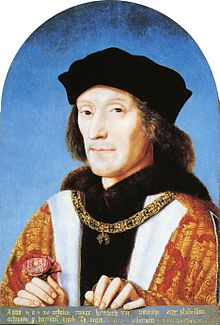King Henry VII
| Henry VII | |
|---|---|

Portrait by unknown artist, 1505
|
|
| King of England (more...) | |
| Reign | 22 August 1485 – 21 April 1509 |
| Coronation | 30 October 1485 |
| Predecessor | Richard III |
| Successor | Henry VIII |
| Born |
28 January 1457 Pembroke Castle, Pembrokeshire, Wales |
| Died | 21 April 1509 (aged 52) Richmond Palace, Surrey, England |
| Burial | Westminster Abbey, London |
| Spouse | Elizabeth of York (m. 1486; d. 1503) |
| Issue |
Arthur, Prince of Wales Margaret Tudor, Queen of Scots Henry VIII, King of England Elizabeth Tudor Mary Tudor, Queen of France Edward Tudor Edmund Tudor, Duke of Somerset Katherine Tudor |
| House | Tudor |
| Father | Edmund Tudor, 1st Earl of Richmond |
| Mother | Margaret Beaufort, Countess of Richmond and Derby |
| Religion | Roman Catholic |
| Signature |  |
Henry VII (Welsh: Harri Tudur; 28 January 1457 – 21 April 1509) was King of England from seizing the crown on 22 August 1485 until his death on 21 April 1509, and the first monarch of the House of Tudor. He ruled the Principality of Wales until 29 November 1489 and was Lord of Ireland.
Henry won the throne when his forces defeated King Richard III at the Battle of Bosworth Field, the culmination of the Wars of the Roses. Henry was the last king of England to win his throne on the field of battle. He cemented his claim by marrying Elizabeth of York, daughter of Edward IV and niece of Richard III. Henry was successful in restoring the power and stability of the English monarchy after the civil war, and after a reign of nearly 24 years, he was peacefully succeeded by his son, Henry VIII.
Henry can also be credited with a number of commendable administrative, economic and diplomatic initiatives, though the latter part of his reign was characterised by financial greed stretching the bounds of legality.
Perhaps most impactful to posterity was his establishment of the Pound Avoirdupois as a weights and measures standard—with several adjustments this became part of the Imperial System and today's International pound units.
His supportive stance of the islands' wool industry and stand off with the Low Countries had long lasting benefits to all the British Isles economy. However, the capriciousness and lack of due process that indebted many would tarnish his legacy and were soon ended upon Henry VII's death, after a commission revealed widespread abuses. According to the contemporary historian Polydore Vergil, simple "greed" underscored the means by which royal control was over-asserted in Henry's final years.
...
Wikipedia
